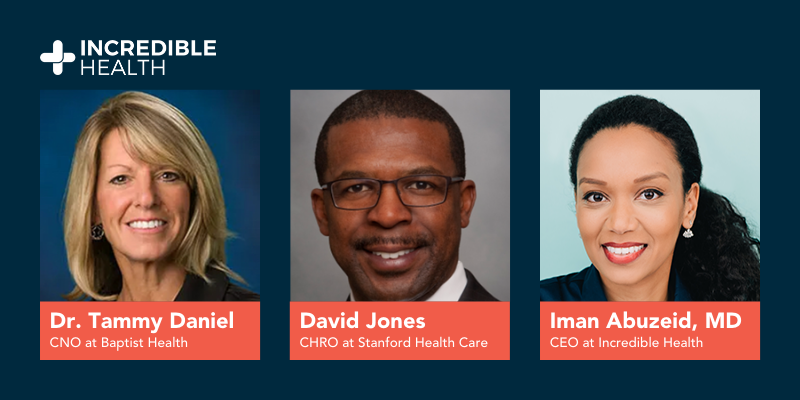Nurse workforce planning is especially difficult during a global pandemic. With COVID-19 exacerbating longstanding challenges, leaders must innovate to support patient demand, new care models, and technology-enabled care delivery.
In this live event recorded on February 10th, 2021, Iman Abuzeid, M.D., Co-Founder & CEO of Incredible Health, David Jones, Chief Human Resources Officer of Stanford Health Care, and Dr. Tammy Daniel, Chief Nursing Officer of Baptist Health, detail how hospitals can use data and automation to enhance their strategic workforce planning, hiring, nurse retention, and patient outcomes.
Key topics covered include:
- The nursing shortage and staffing challenges
- Tactics to improve permanent nurse hiring speed
- Tactics to improve permanent nurse retention
Industry leading panelists

Dr. Tammy Daniel – Under Dr. Tammy Daniel’s leadership as Chief Nursing Officer, Baptist Health has been recognized for the high quality of care provided to patients and their families. With more than three decades of nursing experience and 15 years of Chief Nurse Executive experience, Tammy has a strong record of solving workforce planning issues and driving business outcomes.
David Jones – With over 30 years of experience as a Chief Human Resources Officer, David Jones has led several large-scale organizational changes and HR transformation efforts. He has a strong track record of driving business results, as well as the development and execution of Human Resources strategies in e-commerce, financial services, academic medicine, and healthcare.
Iman Abuzeid M.D. – She founded and serves as CEO of Incredible Health, a career marketplace whose custom matching technology offers hospitals the fastest, most effective way to hire qualified permanent nurses in less than 20 days. It’s used by hundreds of leading hospitals across the country, including Cedars-Sinai Medical Center, Stanford Health Care, Baylor Scott & White, Kaiser Permanente, and many more.
Macro Hiring Environment
Market conditions make it difficult to hire and retain permanent, specialized nurses, including:
- The average acute care turnover rate is 17% annually
- Average time to hire a permanent nurse is 82 days nationally
- Nurse workforce is nearing retirement, with an average age of 54
- By 2024, the United States will have 1 million fewer nurses than needed
The conversation then moved into strategies and tactics for hiring and retaining nurses.
Hiring Permanent Nurses
Leaders may assume that organizations offering the highest salary or best brand would hire the most nurses per month. However, Incredible Health’s data shows 68% of nurses take their first job offer; 61% take their first job offer even if compensation is lower than that of subsequent offers.
The key to hiring nurses is having a faster hiring process than your competitors. Our panelists discussed tactics to increase hiring speed, including:
- Regular check-ins between managers and HR, so the recruiting team can prioritize the highest-need roles
- Continuous interviewing, even after a role has been filled, to ensure a pipeline of available candidates when a role reopens
- Moving from one-on-one interviewing to panel interviews
- Automating low-skill recruiting work using tools like Incredible Health.
- Incredible Health automates low-skill recruiting work and helps hospitals hire permanent nurses in 20 days or less, with custom-matching technology, proprietary screening, data analytics, and workflow software
Retaining Permanent Nurses
There is a lot of focus on hiring nurses, but retaining the nurses hospitals already have is equally important. Many factors contribute to whether or not a nurse stays with their employer, including career opportunities and mentorship, work/life balance and burnout, and COVID safety measures.
Career advancement and flexibility
Hospitals can work to create career advancement opportunities, including committees, training, leadership positions, and fair compensation structures.
Career advancement can start before a candidate is even hired. A conversation about professional goals and growth during the interview, for example to understand an applicant’s academic goals, can help managers and candidates decide whether the hospital is a good fit up front.
At Baptist, Dr. Tammy Daniel has ensured nurses have the information and support to move within departments in the Baptist system. Nurses can meet with career counselors at any time to discuss their goals, understand open roles within the Baptist System, create a career plan, schedule meetings with nurses in their target department, and shadow nurses in their target department.
If a nurse at Baptist wants to specialize in ER, she has tools and support to reach her goals without leaving the hospital system. There’s no minimum time period a Baptist nurse needs to spend in her role before she is eligible to switch.
Scheduling flexibility
Traditionally, most hospitals scheduled 12 hour nurse shifts three times per week. Both Stanford and Baptist have introduced more part time shifts to accommodate nurses’ busy lives. Especially during COVID-19 when nurses may be dealing with sick family members, flexible schedules allow nurses to meet their responsibilities at home without looking for a new role.
Dr. Tammy Daniel shared that part-time shifts have improved patient care and eased nurse burnout, because certain shifts are busy at predictable times. Staffing the busiest periods of each shift with additional part time nurses is better for both nurses and patients.
Work-life balance and burnout
For Stanford Health Care, in addition to career opportunities, leadership is focusing on nurse work/life balance. Stanford is especially focused on ensuring they have enough permanent nurses on staff. Appropriate staffing means nurses are not required work excessive overtime shifts, which allows them more flexibility and rest.
Baptist Health is also focused on broader work/life balance issues, but small, tactical changes have had a meaningful impact as well. Dr. Tammy Daniel shared that Baptist Health introduced a mid-shift nurse huddle, in addition to the existing start of shift huddle. This gives nurses the opportunity to ask for help, advice, and coverage if they need to take a lunch break. Structured support at the beginning and middle of nurse shifts has eased burnout and helped her team maintain high quality patient care.
COVID safety
In addition to nurses’ typical concerns about career trajectory and work/life balance, COVID safety is now a key concern as well. Incredible Health data from May 2020 found that only 2% of nurse respondents said their facility was very prepared to deal with COVID, and 59% said they did not feel adequately supported by their facility to deal with the added stress of COVID.
Creating opportunities for nurses to give feedback on their concerns, listening to the practical changes that would make their lives better, and implementing those changes is key for any hospital system looking to improve long-term nurse retention.
Incredible Health can help
If you’re looking to improve nurse hiring and retention, Incredible Health can help you hire faster and staff teams appropriately to reduce burnout.
Incredible Health supports over 250 hospitals and health systems across the country, and saves each hospital at least $2 million per year per facility in HR costs, overtime, and travel nurse costs.
Get started with a 30 minute introductory call today.
